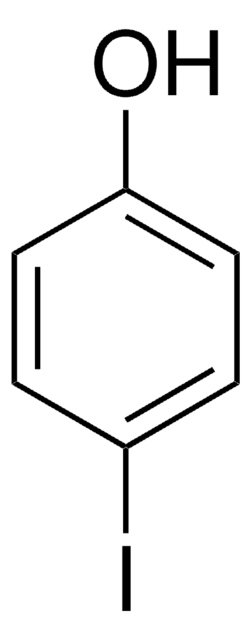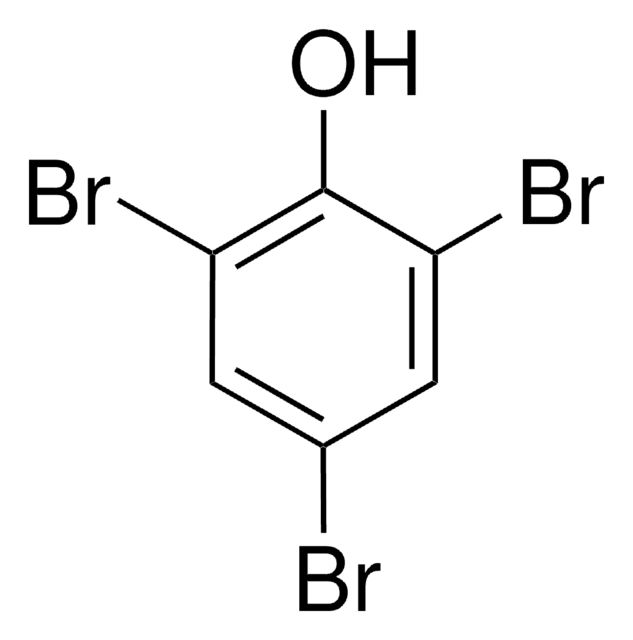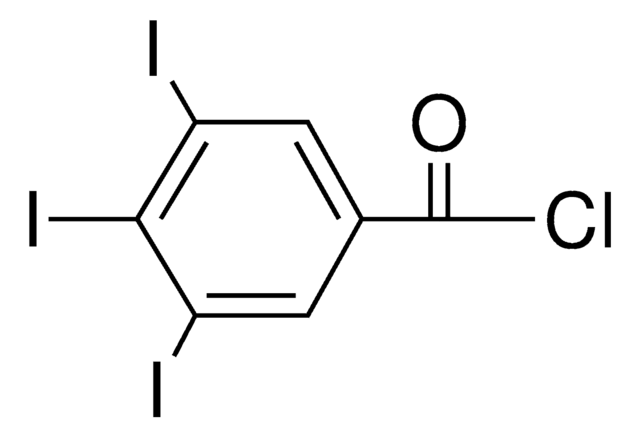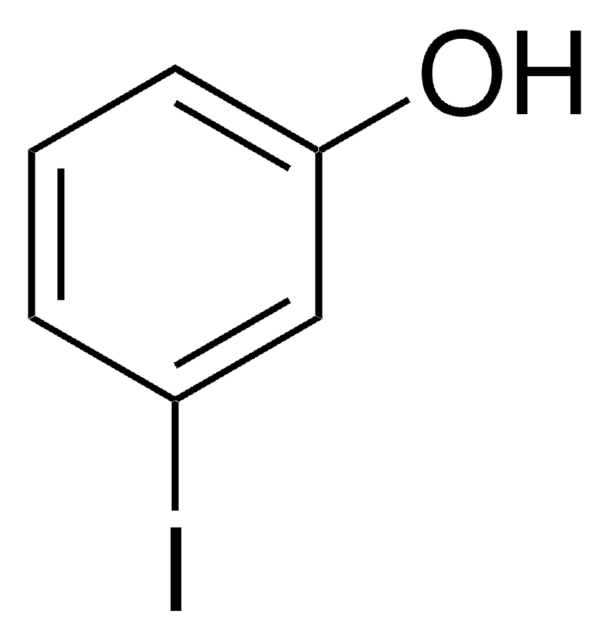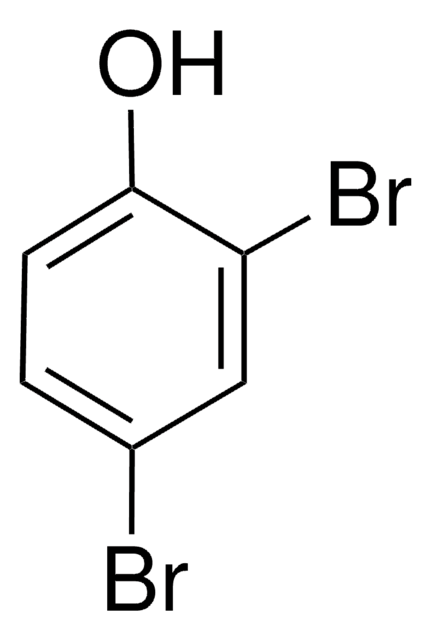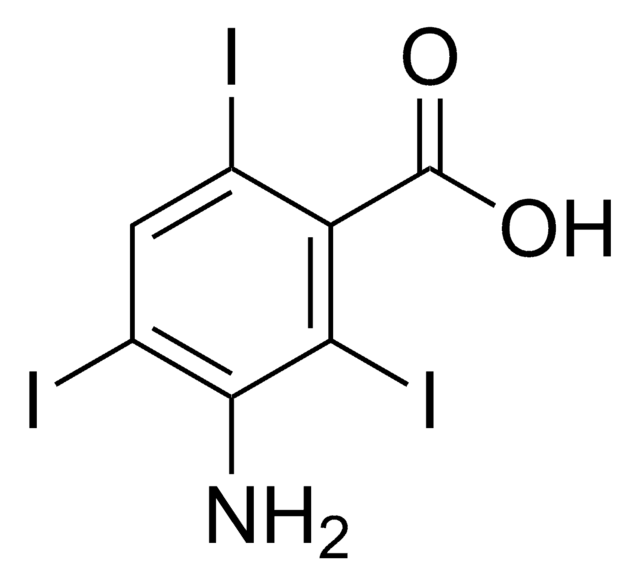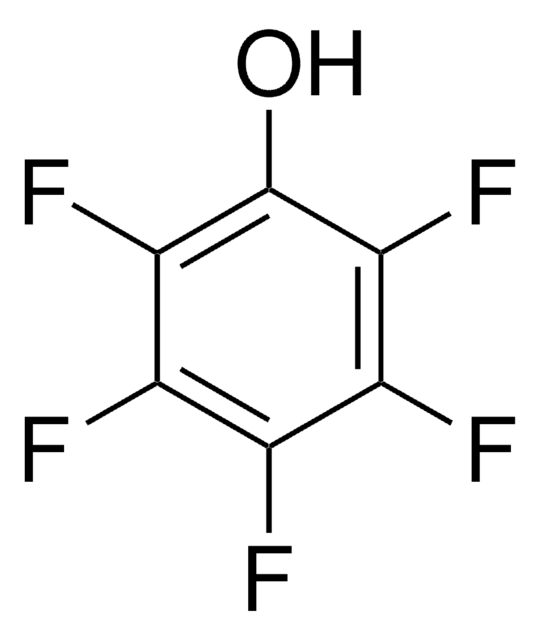All Photos(1)
About This Item
Linear Formula:
I3C6H2OH
CAS Number:
Molecular Weight:
471.80
EC Number:
MDL number:
UNSPSC Code:
12352100
PubChem Substance ID:
NACRES:
NA.22
Recommended Products
Quality Level
Assay
97%
form
powder
mp
157-159 °C (lit.)
functional group
iodo
SMILES string
Oc1c(I)cc(I)cc1I
InChI
1S/C6H3I3O/c7-3-1-4(8)6(10)5(9)2-3/h1-2,10H
InChI key
VAPDZNUFNKUROY-UHFFFAOYSA-N
Looking for similar products? Visit Product Comparison Guide
General description
2,4,6-Triiodophenol is iodinated disinfection byproduct formed during chlorination of sewage effluents. It is a potent thyroid hormone disrupting chemical.
Application
2,4,6-Triiodophenol was used in an in vitro assay to investigate deiodinase activity in human hepatic microsomes.
Signal Word
Warning
Hazard Statements
Precautionary Statements
Hazard Classifications
Acute Tox. 4 Dermal - Eye Irrit. 2 - Skin Irrit. 2 - STOT SE 3
Target Organs
Respiratory system
Storage Class Code
11 - Combustible Solids
WGK
WGK 3
Flash Point(F)
Not applicable
Flash Point(C)
Not applicable
Personal Protective Equipment
dust mask type N95 (US), Eyeshields, Gloves
Choose from one of the most recent versions:
Already Own This Product?
Find documentation for the products that you have recently purchased in the Document Library.
Customers Also Viewed
Tingting Gong et al.
Chemosphere, 163, 359-365 (2016-08-25)
Iodide is widely present in drinking water sources as well as wastewater effluents. Chlorination and chloramination are the most commonly used disinfection methods. During chlorination or chloramination of drinking water/wastewater effluents, iodide may be oxidized to hypoiodous acid, which may
Matilde Parreño et al.
Molecular cancer therapeutics, 5(5), 1166-1175 (2006-05-30)
2,4,6-Triiodophenol (Bobel-24, AM-24) was originally described as a nonsteroid antiinflammatory molecule. We have synthesized three derivatives of Bobel-24 (Bobel-4, Bobel-16, and Bobel-30) and tested their activities as putative antileukemic agents. We have found that Bobel-24 and Bobel-16 were dual inhibitors
José Antonio Castro-Hermida et al.
Veterinary parasitology, 155(3-4), 308-313 (2008-06-27)
The efficacy of the anti-inflammatory drug Bobel-24 against experimental infection by Cryptosporidium parvum was evaluated in neonatal lambs. The animals were treated by oral administration of the drug at 50 or 500 mg/kg of body weight. The prophylactic/therapeutic treatment was
L Xun et al.
Biochemical and biophysical research communications, 174(1), 43-48 (1991-01-15)
Pentachlorophenol (PCP) degrading Flavobacterium sp. ATCC 39723 was found to degrade other polyhalogenated phenolic compounds, including triiodophenol, tribromophenol, and trichlorophenol. Each compound was able to induce the degradation of the other compounds. A PCP Flavobacterium sp. mutant, F-2, was unable
Iñaki F Trocóniz et al.
Pharmaceutical research, 23(7), 1533-1542 (2006-06-20)
The aim of this study was to explore the possibility of achieving a practical dosing regimen for 2,4,6-triiodophenol (AM-24), a new leukotriene B4 (LTB4) synthesis inhibitor. First, a model capable of dealing with the nonlinearity in its pharmacokinetic profile was
Our team of scientists has experience in all areas of research including Life Science, Material Science, Chemical Synthesis, Chromatography, Analytical and many others.
Contact Technical Service
